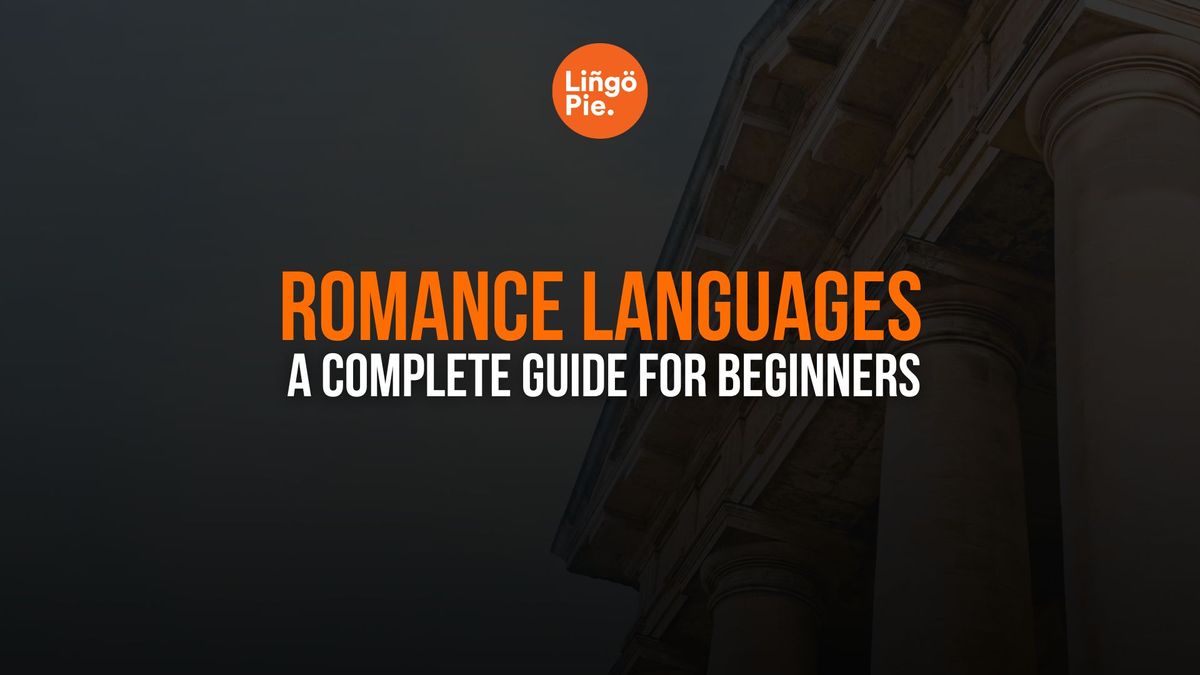Ever wonder why Spanish and French sound so similar? Or why Italian and Portuguese share so many words? The answer lies in their family tree – they're all Romance languages, descendants of ancient ‘vulgar’ Latin. Today, these languages are so well-known that over 1 billion speakers across five continents share this linguistic heritage.
In this guide, we'll answer what romance languages are, where these languages are spoken, and uncover some surprising members of this influential language family that you might not have heard about.
- How To Learn A New Language Fast [5 Science-Backed Shortcuts]
- English or Spanish: 11 Surprising Differences
- Is Spanish easier than French to Learn?
What Are The Romance Languages?
Romance languages are modern languages that evolved from Vulgar Latin – the everyday Latin spoken by soldiers, merchants, and common people during the Roman Empire. Unlike Classical Latin used by scholars and nobility, Vulgar Latin spread through conquest and trade, eventually transforming into the distinct languages we know today.
The Romance language family is impressively diverse, but five major players dominate the field:
- Spanish
- French
- Portuguese
- Italian
- Romanian
Together, these languages account for over 90% of all Romance language speakers worldwide. Each has developed its own unique characteristics while maintaining clear connections to its Latin roots.
| Romance Languages | Romance Languages | Romance Languages |
|---|---|---|
| Aragonese | Friulian | Napoletano-Calabrese |
| Aromanian | Galician | Occitan |
| Asturian | Istriot | Picard |
| Arpitan | Italian | Piedmontese |
| Catalan | Jèrriais | Portuguese |
| Corsican | Judeo-Italian | Romagnol |
| Emilian | Ladin | Romanian |
| Extremaduran | Ladino | Istro Romanian |
| Fala | Ligurian | Megleno Romanian |
| French | Lombard | Romansh |
| Cajun French | Minderico | Campidanese Sardinian |
| Mirandese | Gallurese Sardinian | Logudorese Sardinian |
| Sassarese Sardinian | Shuadit | Sicilian |
| Spanish | Charapa Spanish | Venetian |
| Walloon | Zarphatic |
While most people are familiar with major Romance languages like Spanish and French, the family tree extends far beyond these well-known branches. Many of these smaller languages maintain strong regional identities and cultural significance, even though they may have fewer speakers than their more widely-known cousins.

Spanish
Spanish stands as the second most spoken language in the world by native speakers, with over 500 million people using it globally. Beyond Spain, it's the official language in 20 countries, primarily in Latin America, and continues to grow in influence in the United States, where over 41 million people speak it as their first or second language. Its reach extends from bustling Mexico City to the southern tip of Argentina, making it one of the most widely distributed Romance languages.
| Spanish | Portuguese | English |
|---|---|---|
| libro | livro | book |
| mesa | mesa | table |
| tiempo | tempo | time |
| mujer | mulher | woman |
| noche | noite | night |
French
With approximately 275 million speakers worldwide, French maintains its status as a language of diplomacy and international relations. It's the official language in 29 countries, spanning Europe, Africa, and North America. French continues to be particularly influential in West Africa, where it serves as the primary language of business and education in many nations.
| French | Italian | English |
|---|---|---|
| maison | casa | house |
| pain | pane | bread |
| lait | latte | milk |
| soleil | sole | sun |
| chat | gatto | cat |
Portuguese
PortuguesePortuguese boasts around 250 million speakers globally, making it the sixth most spoken language in the world. Brazil accounts for the majority of Portuguese speakers, but the language is official in nine countries across four continents. Its influence extends from Portugal to Mozambique, Angola, and even Macau.
| Portuguese | Spanish | English |
|---|---|---|
| água | agua | water |
| pão | pan | bread |
| carro | carro | car |
| olhos | ojos | eyes |
| noite | noche | night |
Italian
While Italian has fewer speakers globally compared to Spanish or French, with approximately 85 million speakers, it remains highly influential in the arts, music, and culinary world. Beyond Italy and parts of Switzerland, Italian communities worldwide keep the language vibrant, particularly in former Italian colonies and areas with significant Italian diaspora.
| Italian | Romanian | English |
|---|---|---|
| casa | casă | house |
| pane | pâine | bread |
| acqua | apă | water |
| sole | soare | sun |
| notte | noapte | night |
Romanian
Romanian, spoken by around 24-26 million people, stands unique among Romance languages as the only one that developed east of the Latin-speaking Balkan region. While primarily spoken in Romania and Moldova, it maintains small but significant speaking communities throughout Eastern Europe and has official status in the European Union.
| Romanian | French | English |
|---|---|---|
| carte | livre | book |
| apă | eau | water |
| pâine | pain | bread |
| lună | lune | moon |
| soare | soleil | sun |
What is the Oldest Romance Language?
It’s extremely difficult to ascertain with any certainty which of the five main Romance languages is the oldest; given that they all originated from vulgar Latin, their subsequent development is intertwined, and the Romance languages tree’s branches are hard to untangle.
Italian and Romanian (a romance language spoken in east Europe) are commonly suggested as being the most likely candidates, although the oldest manuscript written in a Romance language discovered to date is the Los Cartularios de Valpuesta, written in a primitive form of Spanish in 804 AD.

Which Language is Closest to English?
If you’re wondering ‘is English a Romance language?’ - no, its credentials on this score are poor! The closest languages to English are Frissian, Dutch, and Danish.
The Romance language definition is a language that derives from Latin - usually vulgar Latin. While the English language has certainly been influenced by Latin, and has borrowed many of its linguistic markers, it principally evolved from Anglo-Saxon dialects that came to Britain from Germany, Denmark and the Netherlands in the fifth to seventh centuries AD, from migrants traveling from those countries.
The Norse language was also a major influence on the evolving English language; this arrived on British shores courtesy of frequent Viking invasions from the eighth to the eleventh centuries. Some Old Norse fragments of vocabulary still remain.
Scots is, arguably, the closest language to English. But this is problematic, as Scots is usually considered to be a dialect, rather than a language in its own right. Both English and Scots have their roots in Old English, and Scots was the main language of Scotland until the eighteenth century. It remains very much a spoken language today.
Why Are Romance Languages So Beautiful?
The Romance languages are widely considered to be distinctly beautiful due to their melodic, musical quality, their ‘smoothness,’ and soft intonations. They also link to cultural associations about elegance, sensuality, and passion.
Linguists also have suggested that these languages appeal to English speakers because of the way in which they contain consonant clusters and sound combinations that are familiar to the English speaking ear - which is different from, for example, Chinese, which uses tonal distinctions in a way not present in European languages.

The Romance languages are often considered the best dialects in which to express love and affection; their musicality and harmonious quality lend themselves perfectly to the murmurings of sweet nothings! Let’s have a look at the specific romantic qualities of each of the big five below:
Spanish - the longer vowels and softer consonants of Spanish make this language sound soft and sensual. Its conjugations also have a rhythmic quality, and it's considered the ideal language in which to write poetry and music.
French - the structure and patterns of consonants and vowels in French make it sound smooth and flowing. Its pronunciation also adds to its musical credentials.
Italian - lilting and rhythmic, to many people speaking the Italian language sounds like singing. It’s often considered to be the most romantic language in the world.
Portuguese - it’s the dramatic and expressive intonation that marks this language out as romantic. Portuguese’s drawn out vowels emphasize its musicality and allure.
Romanian - Romanian is distinct from the other four main Romantic languages due to the strong Slavic influence in the tongue; it’s considered to be musical, passionate and beautifully unique sounding.
What is the Most Difficult Romance Language to Learn?
Romanian is widely considered to be the trickiest of the Romance languages to learn, due to the challenge that mastering its grammar poses. French and Spanish are sometimes cited as being difficult, too.
Some of the aspects that make Romanian hard to learn are its grammatical foibles: the form of nouns are prone to change depending on their relationship to the verb. This is common in languages like Polish and Russian, but isn’t seen in the other Romance languages.
Regional variations can also add complexity for the learner: in some parts of the country the local dialect will incorporate Hungarian words, while in others Slavic influences will be very evident.

On the other hand, there are many factors in the Romanian language’s favor, when it comes to ease of learning. Firstly, the language is highly phonetic, making it comparatively simple to write and read. Its Latin heritage also means that it shares many similarities, when it comes to vocabulary, with other languages.
Spanish, French, and Portuguese are currently all popular languages to learn. When considering whether to learn a new language, and deciding which one to study, it’s common to wonder is Spanish easier than French?
Spanish is usually considered to be easier to become fluent in than French. This is due to the greater consistency of prepositions and gender, and the fact that Spanish doesn’t have complex partitive articles, as French does. The highly phonetic pronunciation of words in Spanish is also generally easier for students to master, making speaking the language less likely to cause difficulties.
Looking at Spanish vs English can also help prospective learners get a better idea of why Spanish is a comparatively easier language to master: Spanish has five vowel sounds to English’s fourteen! The highly formulaic and predictable nature of the linguistic rules of Spanish help, too.
Portuguese is increasingly gaining popularity as an option to study as a second language, although many people hesitate, wondering, ‘is Portuguese hard to learn?’ The rules of grammar in Portuguese, however, follow, broadly, the same rules as the English language; this means that, structurally, the language follows a familiar logic, making it somewhat easier to learn.
What’s Next?
If you’re carefully weighing up which of the five Romance languages to learn, then it can be helpful to think about your motive for this study. If it’s to travel, then a decision will be easy and can be based on the language that will be the most useful to you during your time away.
If you’re trying to decide which, learned as a second language, would offer the most benefits in terms of employability, then this may take a little more research.
Have a look at job specifications for relevant roles in the industry you’re considering, and see how often a specific second language pops up in the ‘desirable section’ to help you make a choice.
And if you want a fun way to learn a language, have a look at Lingopie.







![5 Official Spanish Language Tests To Show Your Proficiency Level [Guide]](/blog/content/images/size/w300/2025/06/Spanish-Language-Tests.jpg)
![Why Memorizing Spanish Words Won’t Make You Fluent [Tips]](/blog/content/images/size/w300/2025/06/how-to-practice-spanish-vocabulary.jpg)
![How to Improve Your Polish Conversation Skills [5 Best Tips]](/blog/content/images/size/w300/2025/06/improve-polish-conversation-skills.jpg)
